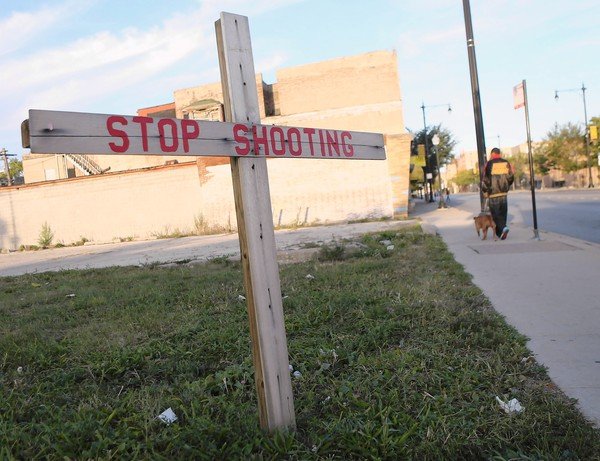Jeff Japinga is substituting today for Lynn Japinga, who is substituting for Steve Mathonnet-VanderWell while he is on sabbatical. Jeff serves as associate dean for doctor-of-ministry and continuing-education programs at McCormick Theological Seminary in Chicago, and is moderator for the RCA’s Commission on Christian Unity.
It’s been a violent year in Chicago, where I work. Homicides citywide have already passed 400, up 25 percent over last year. Most have been gun-related, and of those, the majority are gang-related.
Gangs have been a part of urban life for probably as long as life has been urban. Today, their signature tags are city more ubiquitous even than Starbucks. Not even the garbage bin outside McCormick’s student housing was safe. In the end, of course, tags are about turf, and turf is about power and control: this is our territory, and if you are not for us, you are against us. In some cases, that meant survival; in others, domination.
 Courtesy of the Chicago TribuneThis year’s increase of violence, police say, is largely a result of one particular gang eating itself from within, splintering into smaller factions and engaging in bloody conflict over turf they once shared. Some of my students have told remarkable stories of standing for the gospel in a climate of fear and intimidation. I pray every day for them, and for the churches of Chicago.
Courtesy of the Chicago TribuneThis year’s increase of violence, police say, is largely a result of one particular gang eating itself from within, splintering into smaller factions and engaging in bloody conflict over turf they once shared. Some of my students have told remarkable stories of standing for the gospel in a climate of fear and intimidation. I pray every day for them, and for the churches of Chicago.
There are hundreds of studies about corrosive affect street gangs have on cities and neighborhoods. But after enduring yet another weekend of toxic political shout-fests and negative political advertising, it strikes me that socially corrosive activity is hardly limited to particular urban neighborhoods. Tagging—not the artistic gang expression, but one closely related: to attach or give an epithet to; to label—is increasingly being fought not on city streets and back alleys but the public airwave. Politicians and shadowy funders pit one group against another in a way that continues to eat away at the pillars of generosity, safety, and trust on which social interaction is built. If you are not for us, you are against us, we’re told And as a society, not only are we permitting it, we seem to be encouraging it.
It is, of course, a strategy as old as human sin, repeated across generations and centuries. (I’m guessing those guys at the Synod of Dort held no grace for the Arminians.) And I know the logic behind it: that because what I/we believe is right, it is simply too important not to fight for; that if I don’t fight, all that I stand for will be taken away from me by those without the morals which I have; that in the end, might makes right. Common enemies can build community, focus vision, and energize action in ways little else can.
But if that’s all true—if the ends really do justify the means—then the place where we might have the biggest problem is in the church. Do you recall the lectionary reading last week: “Whoever is not against us is for us.” (Notice the remarkable difference from gang—and political—language.) And the words you and I and Christians around the world heard from behind a common table this week: “the gifts of God for the people of God.”
Shouldn’t we, as Christ-followers, fed by these radically inclusionary words of gospel and table; shouldn’t we be more out front on this? We, who believe that each person is created a child of God, gifted by the Creator and called to serve; who believe both in sin (our own and others) and redemption (our own and others); who are called to welcome the stranger and search for the face of God in every face, even in those with whom we disagree: shouldn’t we be saying a little bit more to the world about what can unite us, instead of writing checks to those who divide?
We’ve never been very good at it, of course, even in our own house. But why couldn’t we be; why couldn’t today’s deteriorating political and social climate be the challenge and opportunity we need: to model a new kind of community, where differences are dignified; where the qualities of common life are embraced, and none are diminished simply because holding them all together is too difficult; where we argue well, love generously, divide sparingly; where kumbaya is found not in artificial peace but in the already-accomplished reconciliation by the triune God in Jesus Christ through the Holy Spirit.
Maybe the time is now to stop shooting, lest, like those Chicago gangs, we discover we’re simply destroying ourselves from within, with significant collateral damage.

